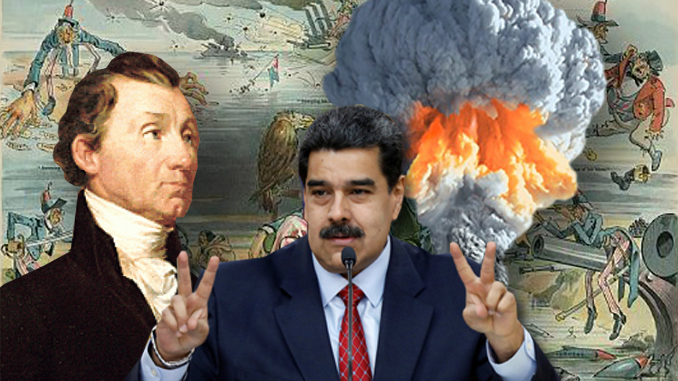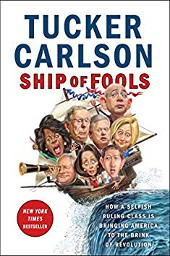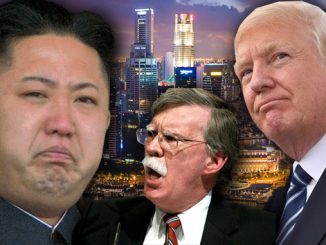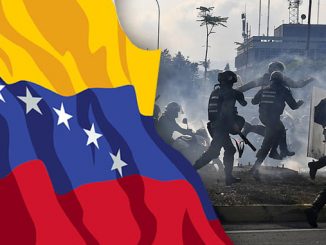
American imperialism is on vivid and hypocritical display in South America, where the recent coup attempt was simply the latest in a long history of foreign coups supported by the U.S. military-industrial complex.
By S.T. Patrick
As a global presence gathers in and around Venezuela in the wake of the U.S.-supported coup, National Security Adviser John Bolton has clenched tightly to Teddy Roosevelt’s metaphoric “big stick” and is warning foreign nations to remember that the U.S. government is entitled to defend the backyard it has extended southward since the Monroe Doctrine first became informal policy in 1823.
In January, the U.S. government outwardly supported opposition leader Juan Guaidó over Venezuelan President Nicolás Maduro. It was another in a long history of foreign coups supported by the U.S. military-industrial complex. All this occurred while American politicos debated whether or not Russian Facebookers bought ads that could have influenced American voters in 2016.
What prompted the recent hardline comments of Bolton was the introduction of Russian, Chinese, and Iranian planes into Venezuela.
“President Trump is determined not to see Venezuela fall under the sway of foreign powers,” Bolton told radio host Hugh Hewitt. Apparently, to neoconservatives like Bolton, the only foreign power allowed to sway the Venezuelan government is the United States.
In making his argument, Bolton emphasized the importance of the Monroe Doctrine, as well as President Ronald Reagan’s anti-communist crusades in Central and South America throughout the 1980s.
The Monroe Doctrine was first outlined by President James Monroe in 1823 during his seventh State of the Union address. Monroe stated that any effort made by a European power to take control of an independent state in South America would be “the manifestation of an unfriendly disposition toward the United States.” In turn and in fairness, Monroe also stated that the United States would then not meddle in the affairs of European countries. It was still a globalist, anti-democratic policy that split up the world into “spheres of influence” controlled, undisturbed, by the major global powers.
The newly-created CIA used the Monroe Doctrine to foment coups after World War II. President John F. Kennedy used it to protect Americans from a growing Soviet missile presence in Cuba. President Reagan invaded Grenada in 1983 and illegally supported the Contras over the Sandinistas in Nicaragua throughout the 1980s. When America has acted aggressively in the Western Hemisphere throughout the 20th and 21st centuries, it has pointed to the Monroe Doctrine as justification.
Bolton continued, “If the Monroe Doctrine fails, if China and Russia, along with Cuba, establish domination over Venezuela, I think American strategic interests will be harmed.”
Further bolstering his belief in the Monroe Doctrine, Bolton said: “We strongly caution actors external to the Western Hemisphere against deploying military assets to Venezuela, or elsewhere in the Hemisphere, with the intent of establishing or expanding military operations. We will consider such provocative actions as a direct threat to international peace and security in the region.”
The problem international observers have recognized is that of hypocrisy regarding the doctrine’s application. In February, the U.S. Navy deployed two guided-missile destroyers to challenge Chinese ships within 12 nautical miles of Chinese outposts in the South China Sea. The U.S. government called it a “freedom of navigation operation.”
China’s foreign ministry spokesman said the U.S. “entered Chinese waters without permission and engaged in provocations that threaten China’s sovereignty.”
President Donald Trump has throughout his presidency also made inroads with North Korean leader Kim Jong Un, progress made largely without consulting the Chinese leadership, though China borders North Korea. Certainly, North Korea is within China’s direct “sphere of influence.”

The U.S. has also stationed tanks, airplanes, and heavy weaponry within NATO-aligned states that border Russia, certainly within Russia’s “sphere of influence.” When challenged by Russian officials, the Pentagon claimed it was innocently deciding where to store a battalion’s worth of military equipment in Europe. The positioning in proximity to Russia was mere coincidence.
More directly, Syria and Iraq are in the Middle East. Afghanistan is in Asia. Libya is in North Africa. Bosnia is in southeastern Europe. All are well beyond the U.S. “sphere of influence” as argued by the directives of the Monroe Doctrine, yet all have seen the heavy presence of U.S. troops in recent decades.
If the entire world is now a local stage for every nation’s national interests, then it is problematic to assert the Monroe Doctrine in the Western Hemisphere, in a country 2,800 miles away from U.S. borders. If the Pentagon is going to continue to justify placing weapons and troops outside the borders of China, Russia, and Iran, then it is understandable that Russia, China, and Iran would see their own interests at stake in the oil-rich country of Venezuela.
The difficulty in accepting U.S. foreign policy as an argument is that Americans are taught and then told that the only goals of foreign policy are U.S. interest, human rights, and furthering democracy. Yet, when arguments for intervention are made, they must also apply to the foreign policy and economic goals of other nations, as well.
S. T. Patrick holds degrees in both journalism and social studies education. He spent ten years as an educator and now hosts the “Midnight Writer News Show.” His email is [email protected].




